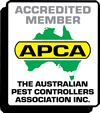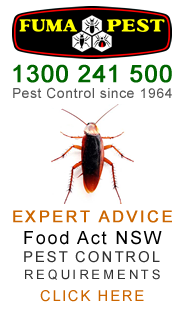| |
FUMAPEST Advice on Pest Control in Nursing Homes
|
|
 |
|
|
Nursing Homes often find food and health related pests in their premises and often need to contract pest control companies for professional pest control in the Hawkesbury Council Region.
Glenn DuBois of FUMAPEST Hawkesbury provides expert advice on professional pest control options • NSW Food Act requirements • HACCP Pest Control methods • Follow-up & Pest Inspections.
Glenn DuBois is Technical Director at FUMAPEST • Secretary of Australian Pest Control Association Inc • Bachelor of Arts (Macq) • Master of Commerce (UNSW) • TAFE Urban Pest Control Certificate • served on NSW Govt Pest Licensing Board & Standards Australia Termite Control Committees. |
| It's far too easy to get a NSW Govt WorkCover Pest Control Licence |
NSW Pest Control Licensing is inadequate - unfortunately, it is far too easy to start up a pest
control business in NSW, employing people to use the more toxic pesticides who do
not have the training or skills to provide a safe and effective service.
NSW Pest Control Licensing system is subject to National "competency" assessment guidelines. Mediocre testing can be carried by private Workplace Assessors (not part of TAFE system). The so-called competency assessment can be a combination of oral, written and visual tests. The assessment can be 1% in writing and 99% oral / visual test, with little audit trail.
Private assessors are given general guidelines in the National competency standards but there is no set standard test or specific knowledge requirements. Once privately assessed as "competent" the relevant State Authority (either Health Dept or WorkCover) will issue a pest control licence. There is no published list of the private Workplace Assessors so it is difficult to gauge the extent of the problem or if the Workplace Assessors are qualified in pest control.
The system is NOT working: Rumours run rife of individuals being assessed over the phone. Such rudimentary "competency" testing appears aimed more at the private assessors getting paid than protection of the consumer. Consumers regularly complain of unskilled ineffective and unsafe practices by licensed pest controllers.
Unrealistic price cutting and resultant inadequate servicing regularly occurs throughout Australia, with some companies operating from a rented residence using a mobile phone number - here today - gone tomorrow.
Using the cheaper more toxic pesticides? BEWARE of very low prices, as this may indicate use of unskilled technicians applying the cheaper old style more toxic pesticides. A hazard to themselves and the general public.
Modern pest control technologies are safer and more environmentally friendly but are more expensive and require a higher level of skill to ensure an effective result. |
In most cases a serious pest infestation will require the use of
some chemicals, in order to minimise the risk of on-going pest infestation. However, there are modern products and technologies available
to suit environmentally sensitive situations.
Firstly - a thorough inspection of the premises particularly likely target pest habitat areas, the pest controller should recommend a range of pest
control methods suited to your particular circumstances, with an emphasis
on safety and an effective result.
|
 |
Termites? REMEMBER: home and building insurance does NOT cover
termite damage to the structural and other timbers in a building. For most types of construction a chemical soil barrier treatment
using Termidor or Premise will provide totally effective protection for over five years.
The most common complaint about some fly-by-night pest controllers is that "the service has not worked - the pests are back" or "the termites are still active in the house" and the business has disappeared. |
| APCA Consumer Advice on Selecting a Pest Controller |
 |
Selecting a professional pest controller to provide an appropriate
"value for money" safe and effective service can be a daunting task. The
Australian Pest Controllers Association Inc has issued consumer protection
advice as summarised below.
Will the business likely be around in the future? Your enquiries should focus on whether the company
has a solid reputation. If a problem arises in the future will the company
still be in existence. |
Review and assess the company's credentials track record, level of staff training and expertise, insurance cover,
warranties offered and safety aspects employed.
|
Obtain several quotes and check out each of the companies First enquire
as to how long the business has been established. Do they have a good reputation
in the market-place. Are they a member of a recognised Pest Control Association?
Ask questions: about the relevant pests in your premises and the different treatment options
the company employs, the chemicals used, their toxicity and safety aspects.
Compare notes. Which company seems more
professional?
Insured? Make
sure the company carries professional indemnity and public liability insurance particularly if you are seeking termite control services and inspection reports.
Be present during the termite inspection: Study the general presentation
of the inspector, such as, was the inspector in company uniform, with proper
identification? Did he/she arrive in a tidy motor vehicle and use quality
equipment, including a moisture meter? Was a thorough inspection carried
out? Were you presented with informative documentation regarding the inspection
findings and treatment proposals? Did he/she adequately explain the alternatives
so you are confident he/she knew his/her subject matter? Were there any
other aspects that may indicate professionalism or otherwise? Make notes
and comparisons.
Enquire re qualifications and experience of termite inspector: Does he/she have a TAFE Pest Control Certificate and a current NSW Govt WorkCover issued pest control license. Is the technician a Trainee? You should cite his/her WorkCover pest control license, noting name, number and expiry date.
Does the company use employees or sub-contractors: Be wary of companies with sub-contractors as problems may occur as the sub-contractors are obliged to pay for the supply of
chemical and other costs but do not assume responsibility if the service
proves to be inadequate at a later date.
Ask about any applicable back-up service period: For example, a company
may provide you with a twelve month "FREE service period" for a chemical
soil barrier treatment where the termite controller is confident a complete
barrier is in place around the entire foot-print or perimeter of the building.
This annual service period may be extended annually thereafter (at the customers
option) provided necessary regular inspections and other essential control
measures are carried out as recommended.
Be wary of companies that offer a 10 or 20 year warranty for termite protection as this
commits you for that period, so you have to obtain (pay for) regular inspections
and other work whether or not you want it. Such a long term warranty offer
is usually unrealistic and a sign of short-term intentions. |
| Books & References on Professional Pest Control |
Handbook on Pest Control USA by Arnold Mallis - the leading industry text book in the USA since 1945 - with 1,400 pages.
Termites - Biology and Pest Management by M.J.
Pearce - an authoritative text on termites and termite control
world-wide.
Termites and other Common Timber Pests by Phil
Hadlington. This is an excellent book on Australian Termites and Timber Borers and their control - written by a leading pest control educational expert.
Trueman's Scientific Guide to Pest Control Operations - Purdue University Indiana USA - more than 500 pages.
Wood-Destroying Insects, Wood Borers and Termites by J.W. Creffield at CSIRO Australia. |
|
| FUMAPEST Termite & Pest Control services the Hawkesbury Council Region |
|
|
|
